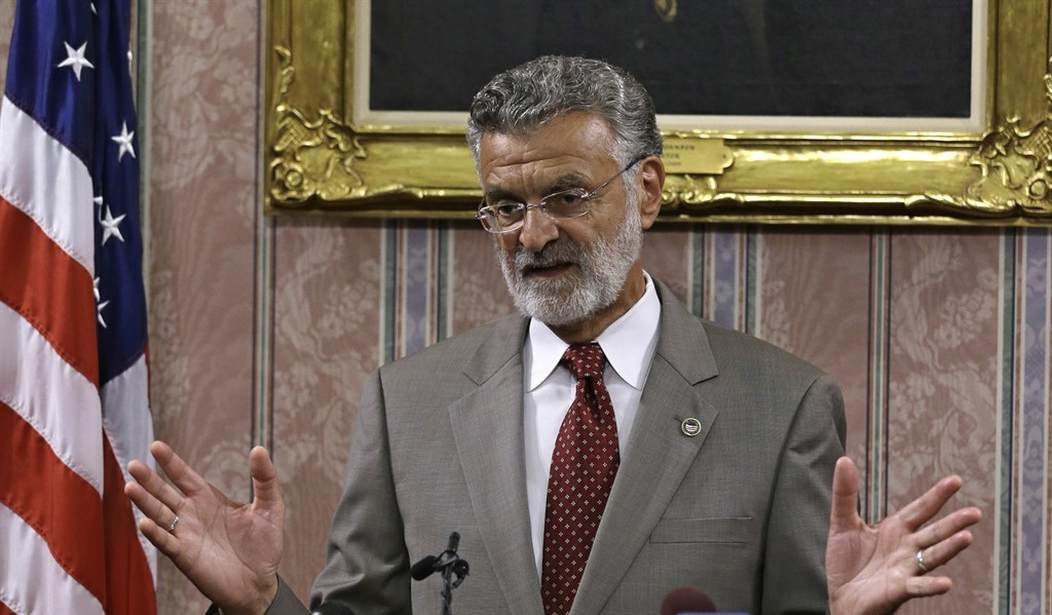Longtime Second Amendment supporters, particularly those in Ohio, know the name Frank Jackson very well. The Cleveland mayor is stepping down this year after four terms in office, making him the longest-serving mayor in city history. For much of that time Jackson has railed against the Second Amendment movement in the state. He even challenged Ohio’s firearm preemption laws by passing several unconstitutional gun control laws that were later struck down. But while Jackson was targeting the state’s legal gun owners, he was also allegedly taking a light hand with one particular individual who was far from law-abiding: his own grandson.
Cleveland Mayor Frank Jackson was more than a grandparent to Frank Q. Jackson.
The mayor treated him like a son, raising the younger Jackson under the same roof for most of his life, several people tell 3News.
Frank Q. Jackson was the son of his stepdaughter. The mayor often acted like a parent, attending his high school football games and other school activities.
The mayor also defended his grandson’s interest in dirt bikes. The mayor acknowledged in 2016 that his grandson’s passion for the riding opened his eyes to what is known as the “bike life.”
That’s one reason the mayor proposed building a dirt bike track in Cleveland as a way to keep riders off the street and out of trouble. The track was never built.
Sadly, Frank Q. Jackson was murdered this past weekend. And while the WKYC-TV story linked above doesn’t detail the younger Jackson’s criminal history, plenty of other news outlets have covered his arrests over the past several years.
Frank Q. Jackson was a suspected member of No-Limit 700, a violent street gang operating in Cleveland. His criminal activity over the past several years regularly appeared in local headlines, given his family connections.
In June, 2019, the younger Jackson choked and violently beat an 18-year-old woman with a truck hitch. Jackson agreed to plea deal in that case. He was found guilty of only a misdemeanor assault charge and received a sentence of 18 months probation. A harsher felonious assault charge could’ve included up to eight years in prison.
Two months later, a 30-year-old man, Antonio Parra, was killed in Cleveland’s Clark-Fulton neighborhood. The suspected assailants drove away in a car registered to Frank Q. Jackson. Jackson told investigators that he’d sold the car the month before, and he was never charged in the case.
There have long been allegations that Mayor Jackson interfered with police and prosecutors when his grandson ran into trouble, and in November of 2019, four months after Parra was murdered, his mother put those allegations in writing. Andrea Parra sued Mayor Jackson and Cleveland Police Chief Calvin Williams for wrongful death and obstruction of justice, accusing Jackson of repeated interference with law enforcement investigations into his grandson and great-grandson (who’s had his own run-ins with the law, including allegedly trying to break into a gun store earlier this year).
Citing an array of local print and TV media sources, the complaint presents a chronology of the Mayor’s grandsons’ gang-related crimes, and documents the ways in which protocol was ignored or abandoned due to the status of the suspects.
The “brutal homicide” of Antonio Parra in Cleveland’s Clark-Fulton neighborhood, in which two assailants drove away in a car registered to Frank Q. Jackson, is described as the culmination of this “culture of impunity.” The killing occurred two months after the violent beating of an 18-year-old woman by Frank Q. Jackson, after which a City Prosecutor failed to prosecute or pass along the case to the County Prosecutor, as is standard, despite an abundance of evidence.
The investigation of Parra’s murder, the complaint says, “as with other cases involving the Mayor’s grandsons, has been marked by anomalous and unexplained deviations from established police policies and procedures.”
Primary matters of concern were the fact that investigators did not question or arrest Frank Q. Jackson and perform a gun residue test to determine if he had recently fired a gun; and allegations, made by anonymous sources in a Channel 19 news report, that Mayor Frank Jackson asked police to turn off their body cameras while at his house. The complaint notes that in at least two previous incidents involving the Mayor’s grandsons’ interactions with police, no body camera footage was available.
The lawsuit against the mayor is still ongoing, by the way, and earlier this year the Ohio Supreme Court refused to dismiss the complaints against the police chief as well.
I’m sure that Mayor Frank Jackson loved his grandson even more than he hates Ohio’s Second Amendment activists, but if it’s true that he repeatedly interfered with police and prosecutors’ handling of Frank Q. Jackson’s cases, he not only abused the public trust but did his grandson no real favor. The younger Jackson had been in trouble repeatedly over the past few years, but never really faced any legal consequences for his criminal acts. He likely felt emboldened and empowered thanks to his grandfather’s position and influence, and it doesn’t sound like the mayor did anything to disabuse him of that notion.
Unfortunately for fans of good government, the Democrats vying to replace Frank Jackson as mayor don’t appear eager to address the allegations against him. After Frank Q. Jackson’s death was reported, the two Democrats who’ll appear on the ballot in November’s general election all offered statements of support without questioning the role that the elder Jackson may have played in keeping his grandson out of prison.
I extend my deepest condolences to Mayor Frank Jackson and his entire family over the loss of his grandson. I’m keeping them in my prayers.
— Justin Bibb for Mayor (@BibbForCLE) September 20, 2021
My deepest condolences go out to Mayor Jackson and the entire Jackson family. The sudden loss of a child and grandchild is tragic, and I ask the entire community to respect the Jackson family as they mourn their loss. They deserve to grieve in peace.
— Kevin Kelley (@kevinkelleyCLE) September 20, 2021
Frank Jackson may not be running for re-election, but it’s pretty clear he still wields a lot of power in Cleveland politics. If he didn’t, I suspect that one or both candidates might be more willing to at least acknowledge the accusations against him. If the allegations are true, then the mayor abused his power and authority to allow his grandson to escape justice in the courts, but couldn’t keep him safe from the gang violence and criminal activity that was allegedly such a large part of Frank Q. Jackson’s short and troubled life. With all due respect to Mayor Frank Jackson (and I do mean all the respect that is due him), I think that’s worth talking about.









